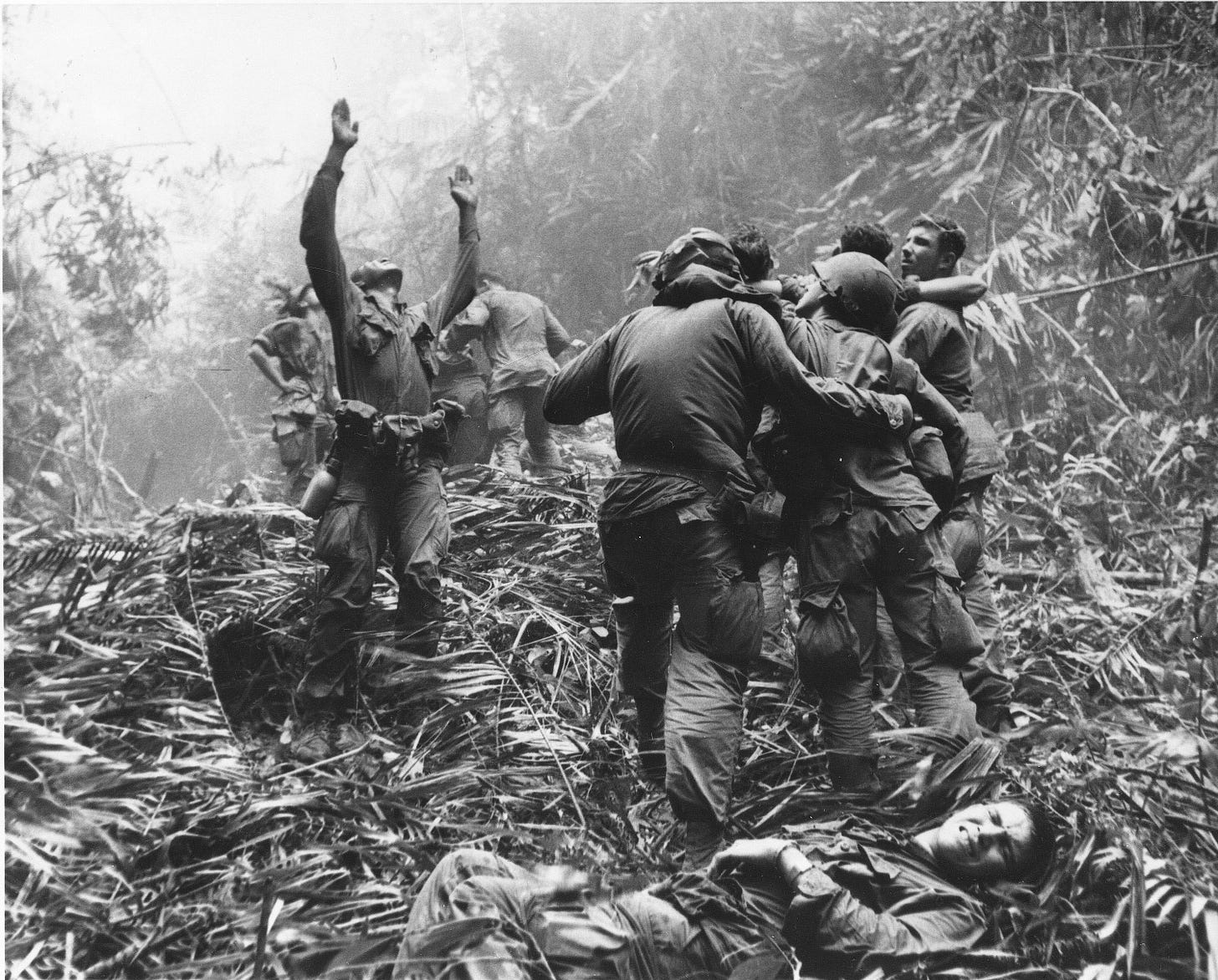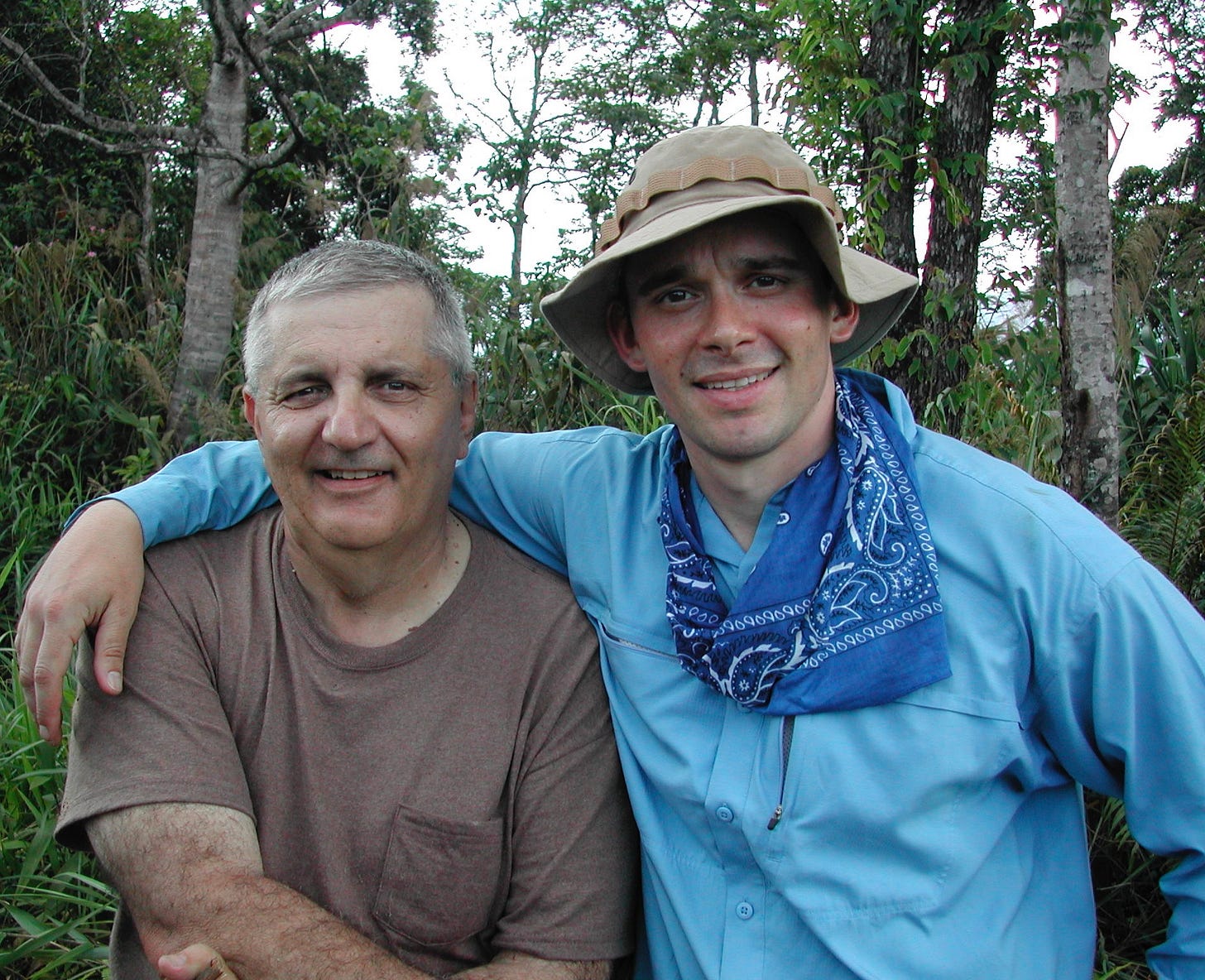Returning to the scene of the battle is moving. I’ve walked Gettysburg and experienced the way your mind can grant an inanimate patch of soil a soul. Something entirely different is returning to the scene of a battle with a veteran of it.
My second child was two weeks old when I got in the taxi for the ride to the airport. My oldest, a girl, was about six, so leaving my wife, with them, wasn’t easy. But this trip was over a year in the making and I was excited for the next 16 days.
I’d never been to Vietnam. Frank our traveling companion had been once before, in 1969, as an officer in the 101st Airborne Division.
We were making the trip to produce a show on a battle that Frank faught in then. Our plan was pretty simple, travel to the city of Hue, in central Vietnam. Then drive out to the A Shau Valley and walk up a mountain called Dong Ap Bia. It has other names, “The Mountain of The Crouching Beast” is one, Hill 937 is another. For American’s of the Vietnam War era it is called Hamburger Hill.
We set out from Hue before sunrise. This part of Vietnam changes quickly. At the coast it is flat. Just a short drive inland and it becomes mountainous with stunning, dense, jungle. It’s beautiful. Arriving in the local village near the mountain we were required to meet and talk with the local leaders.
We chatted for a good spell and had some tea. We were in their home, their backyard, and paying respect to them was expected, rightly. I’d packed a few deflated soccer balls for the trip. After the meeting ended I inflated one in the schoolyard and made some quick friends.
We hired a few people from the village to carry equipment and water. The government official traveling with us suggested paying them a dollar each for the day. It was already over 90 degrees and the humidity was keeping pace. I gave then five dollars each. I still felt cheap. But, they seemed very happy and I was as well, mostly for the reminder that our own context is just that, only our own.
The trail up the mountain was brutal to begin with, straight up, definitely not “Park and Rec” approved. We climbed on all fours at times. We got hot and wet. We had plenty of water and I had a few other things to deal with heat related issues.
I wasn’t particularly worried, that soon changed.
Frank started to slow down. The heat getting the best of him. I’d been encouraging him to drink water. But he’d been resistant. I got out an instant ice pack as he rested on the ground. He held it on his neck and felt better quickly. He was talking and making sense. I was relieved.
Again, I offered him water.
Again, he resisted a drink. Finally, he whispered to me something about not being able to drink a lot of water. My memory blurs here, well, gets more blurry, but I must have asked why, because I learned why.
Frank smiled and picked this moment to inform me that he was down a kidney and half a colon due to cancer. Sitting there, on the muddy floor of the A Shau Valley, I began to worry. We were a 90 minute walk to the cars. The time to a hospital or doctor, I didn’t know for sure.
I did know we’d be along way from care. Before departing we looked into how we might medically evacuate someone on the trip. We followed safety protocol for foreign travel as a journalist. More pertinent? I had even asked Frank about his health. He lied.
After a little more rest we decided to set out. Frank talked about what this trip meant to him. We agreed to slow down and rest more. We all wanted to get to the top. Frank most of all.
In 1969 it was Lieutenant Frank Boccia, First Platoon, Bravo Company, Third Battalion, 187th Regiment of the 101st Airborne Division. The storied Screaming Eagles.
As part of a larger operation designed to interrupt enemy supply lines his unit was tasked with taking the hill, Hamburger Hill. Making our way up the trail I scanned my surroundings and thought about having to do more than simply put one foot in front of the other. The idea of seeing an enemy soldier in the jungle struck me as impossible. You just couldn’t see much beyond the few feet in front of you.
Frank pointed out the way the terrain made maneuver difficult. Narrow ridges, really just a foot path wide before the jungle took over. These narrow trails were framed on either side by steep drops into the jungle you couldn’t walk on.
You walked straight into whatever was ahead on the trail.
In 1969, Franks company was leading the assault. It was going badly. After several assaults Frank was ordered to attack again. He went to his men and I remember him telling me that he never gave the order to gear up. He said the men saw his face and they just got up and got ready. His voice broke as he told me.
This assault failed and eventually Frank’s unit was withdrawn and replaced. His company had lost, to death or injury, over half of its men.
Frank never made it to the peak.
The battle for the hill lasted just over a week. In the end American forces succeeded, taking the hill. Over 400 Americans were killed or wounded. The enemy suffered similarly. A short time later the hill was abandoned. The war in Vietnam was about killing the enemy were ever they were. Holding ground with no enemy to kill was deemed pointless.
This strategy confused some people, why fight for something and not keep it. It’s not an unfair question. This lack of understanding infects the legacy and treatment of Vietnam veterans. Pure and simple, the way they have been treated is a disgrace. People who volunteered or were drafted did what their country asked, ordered.
I’ve done several televisions shows documenting the American war in Vietnam. In arguing to do those shows I’ve said I think it might be the most significant war the United States fought in the 20th century. That’s a claim subject to serious criticism or discussion and it was never the point of any work I did. But making that claim challenged people to consider what they knew, how much they knew. Most don’t know much. That was all a means to an end, I was truly motivated by men like Frank. This failure to honor them is something I hoped to alter, if only slightly.
They deserved to have a story told about them void of all the hackneyed impressions we’ve been given. One that honored the basic nature of armed conflict. They just fight for each other not governments or political leaders. It seems to me the more bureaucratic or political nonsense dumped on them the more they seek strength with the person to the left and right. They just want to get home, get their men home.
Frank was powered up the hill a second time by this. A sense of responsibility to the men he lost. To the men who also didn’t make it. Frank was getting there for the men no longer by his side. .
At the top I asked Frank how he felt. He said he felt neither pleasure nor pain. But then he added if he had one wish it would be that the men he lead and lost could be there with him.
I made a promise to myself after experiencing Frank’s triumph. I’d fallen in love with Vietnam, its people, everything really. I thought of my wife and children back home. I wanted them to see this place and perhaps understand a little more about what happened here.
Ten years later, in the summer of 2016 Frank died. That was my catalyst. My son now 10, daughter 15. We were done waiting. I arranged to go over Christmas when I could get two weeks off and booked the trip.
Fate intervened to make this second journey profund in ways I couldn’t image. On election night that year my mother was diagnosed with cancer, a brief, brave and painful, battle would see her die in just four weeks. And less than two weeks before our planned departure.
I thought about cancelling. Wondered if it was the right thing to do. Then I thought about my mom, she’d be pissed if I did. I thought about Frank and the drive he had to get to the top in 1969 and 2006. So we went.
On a rainy day in the A Shau Valley my family and I walked up Hamburger Hill, Dong Ap Bia, The Mountain of the Crouching Beast, Hill 937. At the summit we paid our respects to those who fought there.
I hoped, by visiting, the confused and complex legacy of this war might be something my kids gained a greater understanding of. I thought about all the Americans who’d come here. I thought about Frank. I wished he could be there so I could tell him again how much he and his men mean to me. I thought about the decade since I’d promised myself I’d come back. Time waits for no one, but a person who knows when to wait has mastered the time they have.
You can hear more from Frank here and you can get his book on the battle here.
Author’s Note: Over the course of my journalism and television career I’ve traveled the world to document the actions of individuals during warfare. I’ve met and interviewed in some capacity 100s of veterans, the actual number might be in the 1000s. This is an ongoing series to memorialize my experience and further record remarkable acts and attitudes the worst of humanity can inspire.













